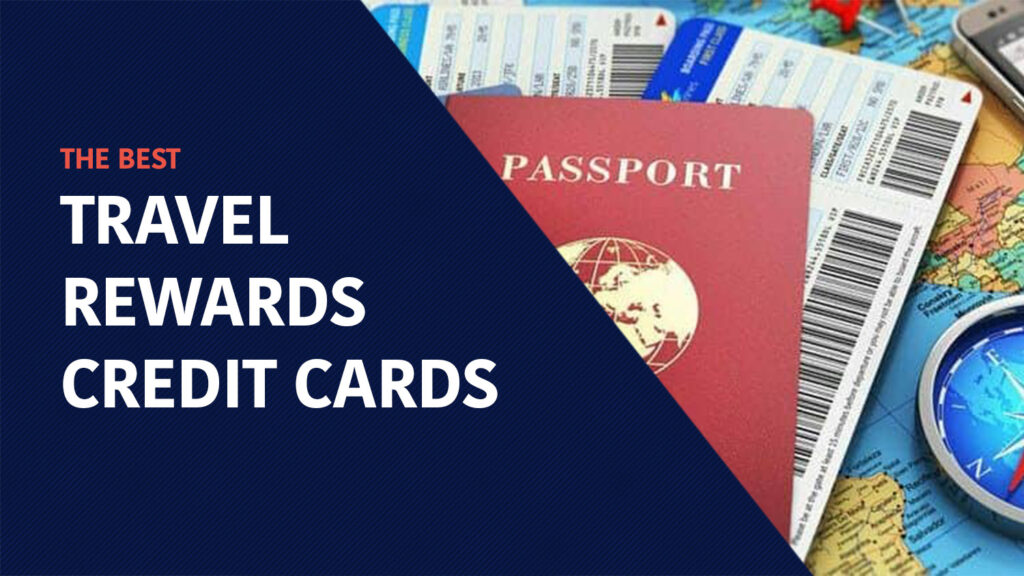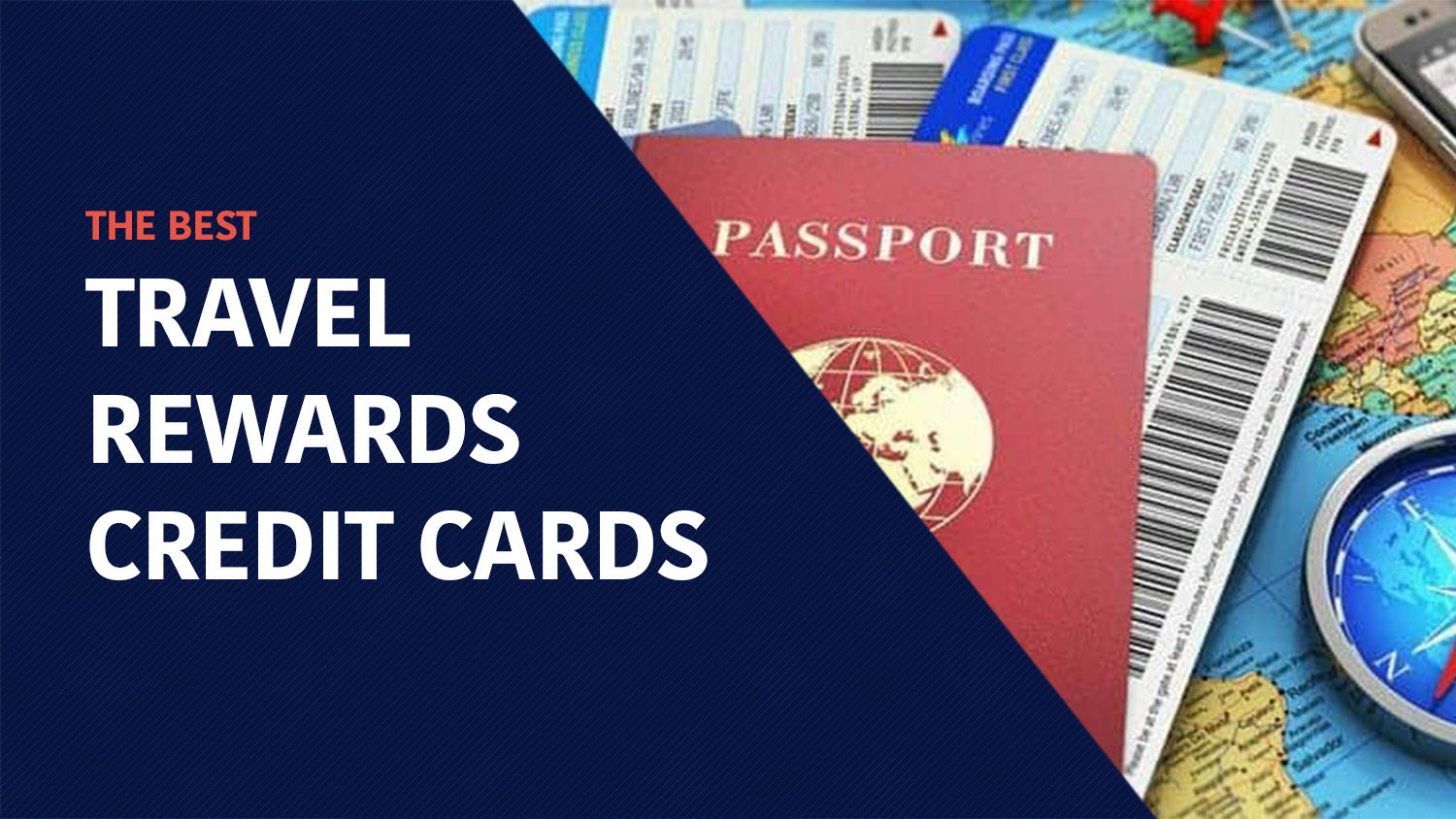
The best travel rewards credit cards make travel hacking easy by rewarding you with points or miles that you can redeem for free airfare or hotel stays. Many also offer premium perks you can’t get with ordinary or cash back credit cards.
At Money Under 30, we’ve been tracking the best travel rewards credit cards for over 15 years to bring you an honest assessment of which cards deliver real value for our readers.
Overview: Best travel rewards credit cards
- Best overall travel card: Capital One Venture Rewards Credit Card
- Best for new travelers: Chase Sapphire Preferred® Card
- Best premium travel card: Capital One Venture X Rewards Credit Card
- Best for airport lounge access: The Platinum Card® from American Express
- Best for travel credits: Chase Sapphire Reserve®
Capital One Venture Rewards Credit Card
Capital One Venture Rewards Credit Card

Information about the Capital One Venture Rewards Credit Card has been collected independently by Money Under 30. Please confirm terms on the card issuer's website. Offer details verified on Apr. 29, 2024.
Welcome Offer
Earn 75,000 bonus miles once you spend $4,000 on purchases within the first 3 months from account opening.
Rewards
Earn unlimited 2 Miles per dollar on every purchase; 5 Miles per dollar on hotels and rental cars booked through Capital One Travel
Annual Fee
$95 annual fee.
Our Thoughts
This is an easy-to-understand popular option that's rightfully among the best travel rewards credit cards. The simple rewards on every purchase, high sign-up bonus for new cardholders, flexible redemption options and cardmember benefits are hard to beat.
Pros:
- High welcome bonus and simple rewards structure for maximizing mileage earnings
- Excellent transfer partners
- Generous travel perks for a low-annual-fee card
Cons:
- Capital One pulls your credit from all three credit bureaus
The Capital One Venture Rewards Credit Card has it all: an excellent welcome bonus, a top-notch rewards program, and generous travel perks for a low annual fee. Cardmembers get up to $100 Global Entry or TSA PreCheck® credit. A perk like that is highly unusual for a mid-tier card, making the annual fee for the Capital One Venture Reward’s an excellent value.
The welcome bonus is the same as the Capital One Venture X Rewards Card, but it’s a cheaper alternative due to the annual fee. The 2x earn rate on all purchases is especially significant if you want to elevate the rewards you earn on everyday spending without tracking category bonuses across multiple cards. This can be your one-and-done rewards card.
- Welcome bonus: Earn 75,000 miles once you spend $4,000 on purchases within 3 months from account opening.
- Rewards: 5x miles on hotels and rental cars booked through Capital One Travel; 2x miles on all other purchases.
- Travel benefits: Hertz Five Star status*; up to $100 Global Entry/TSA PreCheck® credit; no foreign transaction fees.
- Travel insurance: Travel & Emergency Assistance Services and Auto Rental Insurance.
» MORE: Read our Capital One Venture Rewards Credit Card review
Chase Sapphire Preferred®Card
Information about the Chase Sapphire Preferred® Card has been collected independently by Money Under 30. Please confirm terms on the card issuer's website. Offer details verified on Aug. 17, 2024. Earn 60,000 bonus points after you spend $4,000 on purchases in the first 3 months from account opening. That's $750 when you redeem through Chase Travel℠. Earn 5X on travel purchased through Chase Travel℠; 3X on dining, select streaming services and online groceries; 2X on all other travel purchases; 1X on all other purchases. $95 annual fee. A premium travel rewards credit card with a reasonable annual fee that offers a generous sign-up bonus offer for new cardmembers. The valuable travel benefits, perks and protections make sense for just about any level of traveler, but those who utilize Chase Travel℠ or transfer points to Chase’s travel partners will be able to maximize value.Chase Sapphire Preferred® Card

Welcome Offer
Rewards
Annual Fee
Our Thoughts
Pros:
- Generous earn rate on common spending categories
- Flexible loyalty program with good transfer partner selection and ability to redeem for direct bookings through Chase Travel at a rate of 1.25 cents per point
- Generous travel benefits and protections for a mid-tier card
Cons:
- Limitations on the highest spending categories
- Bookings made with the $50 hotel credit don’t earn 5x points
The Chase Sapphire Preferred® Card has had the distinction of being one of the best travel credit cards for over a decade. The card is popular because it offers a generous welcome bonus, which is fairly simple to redeem. You can transfer points to one of 14 airlines or hotels. Or you can redeem points through Chase Travel at just 1.25 cents each. This flexibility makes Ultimate Rewards® points (and the Sapphire Preferred® Card) incredibly valuable.
If one loyalty program devalues, you can transfer your points to a different partner. Just keep in mind that point transfers are not reversible, so don’t do it unless you’re ready to redeem the points.
The Chase Sapphire Preferred® Card is a great starter travel card, and its $95 annual fee is typical for a mid-tier card. However, if you don’t use the $50 annual hotel credit or earn at least 9,500 points per year to justify the annual fee, then it’s not worth it.
- Welcome bonus: Earn 60,000 bonus points after you spend $4,000 on purchases in the first 3 months from account opening. That's $750 when you redeem through Chase Travel℠.
- Rewards: 5x points on travel booked with Chase Travel℠; 3x points on dining (including eligible delivery services), select streaming services, and online grocery store purchases; 2x on other travel purchases; 1x on all other spending.
- Travel benefits: Up to $50 in annual credits towards Chase Travel℠ hotel bookings; no foreign transaction fees.
- Travel insurance: Primary rental car collision waiver; up to $10,000 in trip cancellation/interruption coverage; purchase protection for 120 days; extended warranty protection.
» MORE: Read our Chase Sapphire Preferred® Card review
Capital One Venture X Rewards Credit Card
Information about the Capital One Venture X Rewards Credit Card has been collected independently by Money Under 30. Please confirm terms on the card issuer's website. Offer details verified on Apr. 28, 2024. Earn 75,000 bonus miles once you spend $4,000 on purchases within the first 3 months from account opening. Earn 10 Miles per dollar on hotels and rental cars booked through Capital One Travel; 5 Miles per dollar on flights booked through Capital One Travel; unlimited 2 Miles per dollar on all other purchases. $395 annual fee. A premium travel credit card option that's a step up from the Venture Rewards. For those fine with Capital One Travel, the airport lounge access, annual credit, anniversary bonus miles and travel-friendly perks can make this card worth the high annual fee. Just be sure to maximize all it has to offer.Capital One Venture X Rewards Credit Card

Welcome Offer
Rewards
Annual Fee
Our Thoughts
Pros:
- Elevated earn rate on everyday spending
- High welcome bonus for a reasonable spending requirement
- Excellent travel perks and recurring benefits
Cons:
- Travel bonuses are limited to Capital One bookings
- High annual fee
- Capital One pulls your credit from all three credit bureaus
The Capital One Venture X Rewards Credit Card is a relatively new travel credit card but has quickly distinguished itself as one of the best.
The card offers a substantial welcome bonus and elevated earn rate that makes racking up points fast and easy. Even if you don’t take advantage of the 5-10x travel bonus, you’ll earn 2x miles on all spending. This earning structure is ideal for people who don’t want to deal with tracking category bonuses. If you want a single credit card in your wallet that earns more than one mile per dollar spent, this is the card for you.
The card’s $395 annual fee is high but still lower than most premium credit cards. However, the recurring benefits offset it — think things like a $300 annual travel statement credit for Capital One Travel bookings and a Global Entry/TSA PreCheck® credit every four years. Best of all, the card offers a yearly 10,000-mile bonus worth $100 towards travel.
The only downside about Capital One is that the bank pulls your credit from all three bureaus rather than just one, making for a sure hard hit on your credit score. However, if you keep this card long-term, it’s worth it.
- Welcome bonus: Earn 75,000 bonus miles once you spend $4,000 on purchases within the first 3 months from account opening
- Rewards: 10x miles on hotels and rental cars booked through Capital One Travel; 5x miles on flights booked with Capital One Travel; 2x miles on all other purchases
- Travel benefits: $300 annual travel statement credit on Capital One Travel bookings; up to $100 Global Entry or TSA PreCheck® credit every four years; 10,000 anniversary bonus miles (worth $100 towards travel); Hertz President’s Circle® status*, and; no foreign transaction fees.
- Travel insurance: Travel accident insurance, auto rental coverage.
» MORE: Read our full Capital One Venture X Rewards Credit Card review
The Platinum Card® from American Express
All information about The Platinum Card from American Express has been collected independently by MoneyUnder30.com. Content has not been reviewed or approved by the issuer. Earn 80,000 Membership Rewards points after you spend $8,000 on purchases on your new card in your first six months of card membership. Earn 5X Membership Rewards points for every $1 spent on flights booked directly with airlines or through American Express Travel (up to $500,000 spent on these purchases per calendar year); 5X points on prepaid hotels booked on amextravel.com; and one point per $1 spent on eligible purchases elsewhere. $695 World-class luxury travel perks that make the high annual fee well worth it if you can take advantage. Offer details accurate as of 9/6/23The Platinum Card® from American Express
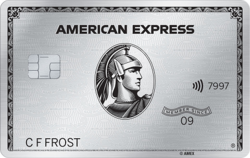
Welcome Offer
Rewards
Annual Fee
Our Thoughts
Pros:
- Loaded with travel and dining credits that help offset the annual fee
- Automatic elite status with Hilton and Marriott
- Substantial welcome bonus that will cover at least one round-trip international business class fare
- Transfer your points to 20 airline and hotel partners
Cons:
- High annual fee
- Lack of meaningful category bonuses
- Requires excellent credit
The Platinum Card® from American Express has one of the highest annual fees at $695, but it also comes packed with travel credits and benefits galore. Taking advantage of them would get you well over $1,500 in value every year. Between the elite status perks, travel credits, digital entertainment credits, and lounge membership, it offers the most comprehensive travel perks of any credit card.
The Amex Platinum also offers best-in-class travel insurance. All you have to do is charge your travel bookings to the Platinum card, and you’ll be protected in case of cancellations and delays.
With a 80,000-point welcome bonus, you can book an off-peak round-trip business class ticket to Europe with All Nippon Airways miles. Or you can opt for economy class and cover up to four round-trip tickets to Europe using Flying Blue rewards.
The Amex Platinum is an excellent travel rewards card if you want a large welcome bonus and tons of travel perks. But the annual fee is hefty, and the card lacks any meaningful category bonuses beyond direct travel bookings. If you don’t think you’ll be able to get your money’s worth through the various credits every year, you might want to consider a different card.
- Annual fee: $695
- Welcome bonus: Earn 80,000 Membership Rewards® points after spending $8,000 within the first six months
- Rewards: 5x points on flights booked direct with airlines; 5x points on prepaid hotels booked directly with amextravel.com; 1x point on all other purchases
- Travel benefits: $300 annual Equinox credit (issued monthly); $200 annual credit on prepaid hotels booked through Amex Travel; $200 in annual Uber Cash (distributed monthly); $200 annual airline fee credit; $155 Walmart+ credit; $20 monthly digital entertainment credit; access to the Amex Global Lounge Collection; $189 CLEAR credit; Global Entry/TSA PreCheck® credit every five years; $100 Saks credit issued semi-annually; Hilton and Marriott Gold status; access to Amex Fine Hotels & Resorts; premium car rental status; no foreign transaction fees
- Travel insurance: Primary rental car coverage; trip delay insurance (up to $500 per trip); trip cancellation & interruption insurance (up to $10,000 per trip)
Chase Sapphire Reserve®
Information about the Chase Sapphire Reserve® has been collected independently by Money Under 30. Please confirm terms on the card issuer's website. Offer details verified on Aug. 17, 2024. Earn 60,000 bonus points after you spend $4,000 on purchases in the first 3 months from account opening. That's $900 toward travel when you redeem through Chase Travel℠. Earn 10x total points on hotels and car rentals when you purchase travel through Chase Travel℠; 5x total points on flights through Chase Travel℠; 3X points on other travel and dining; 1 point per $1 spent on all other purchases. Rewards on travel after the $300 is spent on travel purchases annually. $550 annual fee. Flexible rewards and premium travel perks, like airport lounge access and powerful travel protections, make this a top option for travelers who will maximize the benefits. Occasional travelers may want to consider a less premium alternative given the high annual fee.Chase Sapphire Reserve®
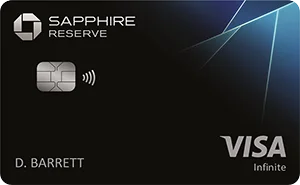
Welcome Offer
Rewards
Annual Fee
Our Thoughts
Pros:
- The current welcome bonus is valid for $900 toward travel when you redeem through Chase Travel℠ or can be transferred to 14 airline and hotel partners
- The $300 annual travel credit offsets most of the annual fee
- Excellent travel protections and benefits
Cons:
- High annual fee
- $75 annual fee applies per additional authorized user
The Chase Sapphire Reserve® is a great choice if you want a premium credit card that earns points redeemable for travel. The card currently has a welcome bonus of Earn 60,000 bonus points after you spend $4,000 on purchases in the first 3 months from account opening. That's $900 toward travel when you redeem through Chase Travel℠. It also offers plenty of category bonuses to help you keep earning points beyond the initial bonus.
The $300 annual travel credit partially offsets the $550 annual fee. Cardmembers also get Priority Pass membership, up to $100 towards TSA PreCheck®, Global Entry or NEXUS application fees. The card also has plenty of travel protections, so you can charge your travel expenses with peace of mind.
Chase’s points are a great program, whether you want to maximize its transfer partners or use it for direct travel bookings. Sapphire Reserve® cardholders can redeem their points for 1.5 cents each towards Chase Travel℠ bookings. This flexibility is great for folks looking for simple redemption options.
- Welcome bonus: Earn 60,000 bonus points after you spend $4,000 on purchases in the first 3 months from account opening. That's $900 toward travel when you redeem through Chase Travel℠.
- Rewards: 10x points on hotel and car rental bookings through Chase Travel℠; 5x points on Chase Travel℠ flight bookings; 3x points on travel worldwide; 3x points on other dining purchases (including eligible delivery services; 1x points on all other purchases
- Travel benefits: $300 annual travel credit; Priority Pass Select membership; up to $100 Global Entry, TSA Precheck or NEXUS fee credit every four years; Luxury Hotel & Resort Collection perks
- Travel Insurance: Trip cancellation and interruption insurance (up to $20,000 per trip); trip delay reimbursement (up to $500 per ticket); primary rental car coverage (up to $75,000); lost luggage reimbursement (up to $3,000 per passenger); emergency evacuation and transportation coverage (up to $100,000)
» MORE: Read our full Chase Sapphire Reserve® review
The competition
There are dozens of travel rewards credit cards that, while great in some ways, just failed to make our cut for the 5 best. Here’s a look at some runnners-up for our list of best travel rewards credit cards.
Citi Premier® Card
Citi Premier® Credit Card
Annual Fee
Intro APR, Purchases
Intro APR, Balance Transfers
Regular APR
Credit Needed
$95
N/A
N/A
21.24% - 29.24% (Variable)
Pros:
- High welcome bonus that transfers to 16 airline and hotel programs
- $100 hotel credit on Citi ThankYou® Travel bookings of $500 or more
- Reasonable annual fee
Cons:
- No travel protections
- $100 hotel credit excludes taxes and fees
At first sight, the Citi Premier® Card shouldn’t be on this list. The card has no travel protections, which is not ideal when booking thousands of dollars in travel. However, if you buy travel insurance anyway, then the Citi Premier® isn’t so bad. It’s a great card for maximizing spending on everyday purchases.
The card earns 3x points on select travel and common spending categories like dining, gas, and groceries. Cardmembers also get a $100 annual hotel credit valid on Citi Travel bookings of $500 or more. Considering the $95 annual fee, this perk is pretty generous.
The Citi ThankYou® program is also one of the best, allowing you to transfer the card’s substantial bonus to 16 airline and hotel programs.
If you want a travel rewards card that really rewards you in your everyday life, this is a great card. Just think twice about charging expensive travel bookings to it, since they won’t be protected.
- Welcome bonus: 60,000 bonus ThankYou® Points after you spend $4,000 in purchases within the first 3 months of account opening. These points are redeemable for $600 in gift cards at thankyou.com.
- Rewards: 3x points at restaurants, supermarkets, gas stations, air travel, and hotels; 1x on all other purchases
- Benefits: Annual $100 hotel savings on a booking of $500 or more (excluding taxes and fees); no foreign transaction fees
- Travel insurance: None
AAdvantage® Aviator® Red World Elite Mastercard®
Pros:
- Easy welcome bonus
- Free checked bags and priority boarding when flying American Airlines
- Ability to earn a Companion Certificate every year
Cons:
- $99 annual fee
- Airline miles are more limited in use than transferable rewards
The best airline credit card is a tough one because it really comes down to your airline loyalty and whether you live near a hub city. But there’s a good reason we’ve chosen the AAdvantage® Aviator® Red World Elite Mastercard® for this category. The card offers one of the easiest spending requirements to complete and includes several ongoing perks that provide value beyond the $99 annual fee.
The Aviator Red card’s 50,000-mile welcome bonus is easy to earn. You only need to use the card once (for any purchase), and you’ll earn 50,000 bonus miles.
The card also offers a free checked bag on American Airlines flights, discounts on in-flight purchases and Wi-Fi credits, and a $99 Companion Certificate when you spend $20,000 in a year. Best of all: every dollar spent on this card counts towards elite status with American Airlines.
- Annual fee: $99
- Welcome bonus: 50,000 bonus miles after the first purchase and paying the $99 annual fee
- Rewards: 2x miles on all American Airlines purchases; 1x mile on everything else
- Travel benefits: $25 in statement credits towards in-flight Wi-Fi purchases; 25% discount on inflight food and beverage purchases; free first checked bag; preferred boarding; $99 Companion Certificate every year you spend $20,000 on the card; no foreign transaction fees
- Travel Insurance: Travel accident insurance; trip cancellation & interruption coverage; baggage delay insurance; auto rental collision coverage
Hilton Honors American Express Aspire Card
Pros:
- Automatic top-tier Hilton Honors elite status
- Annual free weekend night and resort credits help offset the annual fee
- Generous category bonuses, with an additional spending incentive
Cons:
- $450 annual fee
- Priority Pass membership from American Express cards does not include access to airport restaurants
- Hilton points have limited use
The Hilton Honors American Express Aspire Card is arguably the best hotel credit card. If you’re looking to earn Hilton points and make your next stay more rewarding, look no further.
Cardmembers get automatic top-tier Diamond status, which normally requires 42 nights, 21 stays, or 84,000 base points. Diamond members get free complimentary breakfast (or a dining credit at U.S. properties), club lounge access, space-available room upgrades, and 100% bonus points on paid stays.
Cardmembers also receive an annual free weekend night award, plus the ability to earn a second free night after spending $60,000 in a calendar year.
A $250 airline fee credit makes the $450 annual fee more palatable, along with the Priority Pass membership.
The only downside? American Express cards don’t get restaurant access with their Priority Pass membership, and some airports have restaurants that are part of the Priority Pass network. Members receive a credit of $28-$35 per person at these restaurants, which is handy when airline lounges are full or closed.
The Hilton Aspire Card offers a ton of value beyond the welcome bonus. Even if you just stay at one Hilton hotel a year, you can get your money’s worth. The card’s category bonuses make it easy to earn Hilton points. The only negative side to this is that you’re earning Hilton points rather than a transferable currency with more flexible use.
- Annual fee: $450
- Welcome bonus: 150,000 Hilton Honors bonus points after spending $4,000 within your first three months of card membership
- Rewards: 14x points on hotels and resorts; 7x points on travel (flights booked directly with airlines or Amex Travel, cars booked with select companies); 7x points at U.S. restaurants; 3x points on all other purchases
- Travel benefits: Annual free weekend night reward; $250 annual Hilton resort credit; annual $250 airline fee credit; $100 property credit at select hotels booked for two nights minimum; top-tier Hilton Diamond elite status; Priority Pass Select membership; no foreign transaction fees
- Travel insurance: Secondary rental car collision coverage; up to $3,000 baggage insurance plan
American Express® Gold Card
All information about The AMEX Gold Card has been collected independently by MoneyUnder30.com. Content has not been reviewed or approved by the issuer. Earn 60,000 Membership Rewards points after you spend $4,000 on purchases on your new card in your first six months of card membership. Earn 4X Membership Rewards points for purchases at restaurants worldwide; 4X Membership Rewards points for groceries at U.S. supermarkets (up to $25k in purchases); 3X points on flights booked directly with airlines or on amextravel.com; and 1X point per $1 spent on eligible purchases elsewhere. $250 High rewards potential on everyday purchases and travel purchases make the Gold Card a well-rounded offer for anyone. Offer details accurate as of 9/6/23American Express® Gold Card
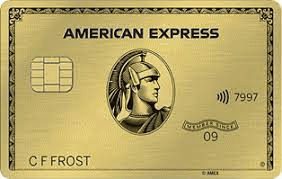
Welcome Offer
Rewards
Annual Fee
Our Thoughts
Pros:
- Category bonuses are great for maximizing everyday spending
- Amex has 17 airline and hotel partners, with periodic transfer bonuses
- Statement credits can offset the annual fee
Cons:
- Car rental coverage is secondary — upgrade to primary coverage costs $12.25-$24.95 per rental through Premium Car Rental Protection
- $250 annual fee is high
- Statement credits are limited to select merchants
The Amex Gold Card is an excellent travel card for everyday use. It offers generous category bonuses to help you maximize everyday purchases. Plus, the card provides monthly statement credits at select restaurants and Uber Cash that can make dining out (and transportation) easier. The Uber credits are valid on both UberEats and Uber rides, making them great for travelers and homebodies alike.
The 4x bonus on dining applies to restaurants worldwide, so you can continue maximizing this bonus even while out of the country. The card also has several travel protections, so you have peace of mind when booking your trips.
The downside? The $250 annual fee is steep; not everyone will find value in the statement credits. Amex’s once-per-lifetime rule can also make the welcome bonus less attainable. My advice? Wait for a higher offer. Not too long ago, the card was offering 90,000 bonus points. Since you’re limited to one bonus, you might as well hold out for the highest one possible.
- Annual fee: $250
- Welcome bonus: 60,000 bonus points after spending $4,000 within the first six months of card membership.
- Rewards: 4x points at restaurants worldwide; 4x points at U.S. supermarkets (up to $25,000 per year); 3x on flights; 1x on all other purchases
- Travel benefits: $10 monthly credit valid at Cheesecake Factory, Gold Belly, GrubHub, Milk Bar, Wine.com, and select Shake Shack locations; $10 monthly Uber cash; no foreign transaction fees
- Travel Insurance: Baggage insurance plan (up to $1,250); secondary car rental coverage
How we came up with our list of the best travel rewards credit cards
Our methodology: a blend of data and real-world experiences
Hey there, savvy traveler! You’re wondering how to max out the perks on your next adventure, right? A top-notch travel rewards credit card can be your best friend on the road (or in the air!). With so many choices, picking the right one can be confusing. Don’t sweat it; we’ve got you covered.
The nitty-gritty of numbers: data-driven insights
First things first, let’s talk about the data. Our team went all-in, examining more than 50 credit cards by looking at key factors:
- Annual fees: Who wants to pay to spend money? Not us! So, cards with low or zero annual fees got our attention.
- APRs: Lower is better, but hey, we’re mostly here for the rewards, right?
- Reward rates: The higher, the merrier. We love cards that make every dollar count, especially on travel expenses.
- Redemption options: The more ways to use those points, the better.
From the horse’s mouth: consumer reviews and surveys
Reviews tell you what the brochure won’t. We took a deep dive into what actual card users are saying. Are those points easy to redeem? How’s the customer service? Real-world insights made a big difference in our rankings.
Insider knowledge: consulting financial analysts
Time to get a bit serious. We wanted the lowdown on the intricate stuff, so we turned to financial analysts who eat, sleep, and breathe credit card rewards. Their wisdom helped us avoid common pitfalls and uncover some hidden gems.
Tailoring to tastes: frequent traveler preferences
Travel comes in all shapes and sizes, and so should your credit card rewards:
- Global acceptance: You want a card that’s good to go, anywhere you are.
- Foreign transaction fees: Lower fees mean you can spend more on what you love—like exploring!
- Travel insurance: Because it’s always good to have a safety net.
Keeping it fresh: regular updates
Credit card deals are a moving target. Offers come and go, and we’re committed to keeping our list as current as your Instagram feed.
By taking this comprehensive, data-rich approach, we’ve put together a list that we’re proud to stand by. Whether you’re a globe-trotter or a weekend warrior, you’ll find a card here that gets you where you want to go—and makes the journey just as rewarding as the destination.
How do travel credit cards work?
Travel credit cards offer rewards that you can redeem for nearly-free flights and hotel nights. There are generally three types of travel credit cards: ones that earn transferable points, that earn hotel points, or that earn airline miles.
A diverse points portfolio is part of a good travel hacking strategy, so you should aim for at least one credit card that earns transferrable rewards. This way, you’re not stuck with one currency and have flexibility in redeeming points. If one loyalty program devalues, you can transfer your points to another one. If one program limits award space, you can transfer points to one with the seats or rooms you need.
Travel credit cards go beyond points. Many offer recurring travel perks like free hotel nights, airline credits, lounge membership, elite status perks, and more. If you play your cards right, travel credit cards can improve your travel experience substantially and help you save money.
The only downside is that most travel cards carry annual fees. Some of these fees go as high as $695. You’ll want to evaluate the card’s features and recurring perks before choosing one. The last thing you want is to shell out thousands of dollars in credit card annual fees and not get your money’s worth.
Types of travel rewards credit cards
When it comes to travel rewards cards, there’s something for everyone. But not all cards are created equal. Here’s a rundown on the types of cards you might come across. Find out which one is your ticket to making the most out of your travels.
Cash back travel rewards cards
What they offer:
- Easy-to-understand rewards, as a percentage of your spending comes back to you as cold, hard cash.
- Unparalleled flexibility—your rewards can be used any way you like.
Who should consider this:
- If you want to keep it simple, or if you’re new to the world of credit cards, this is for you.
- For those who want to use rewards for more than just travel—maybe you’ve got your eye on some new tech gear or a fancy dinner.
What to know before you commit:
Cash back rewards can typically be used for anything, not just travel-related expenses. This means you’ve got a lot of room to maneuver when planning how to use your rewards. But make sure to check for any limitations or expiry dates on your cash back.
Points-based travel rewards cards
What they offer:
- Points for every dollar you spend, which can then be redeemed for flights, hotels, or even shopping vouchers.
- Partnerships with different airlines and hotel chains mean you can often get more bang for your buck.
Who should consider this:
- If you’re the type of traveler who loves to game the system, collecting points like they’re Pokémon, then this one’s for you.
- Brand loyalty can pay off big time with these cards.
What to know before you commit:
Some points-based cards have restrictions on where you can redeem your points. For example, certain airlines might be off-limits. Keep an eye out for transfer fees when moving points between loyalty programs, too.
Frequent flyer airline cards
What they offer:
- Points or miles that are tied to one specific airline.
- Perks that will make your airport experience less of a hassle—think priority boarding and free checked bags.
Who should consider this:
- If you find yourself always flying the same airline, whether it’s for work or leisure, this card could really work in your favor.
What to know before you commit:
These cards are great, but they’re not so flexible. Your rewards are generally tied to one airline, so make sure it’s an airline you like and one that flies to destinations you actually want to visit.
Hotel co-branded cards
What they offer:
- Points and perks that are geared toward stays at specific hotel chains.
- Rewards that can include free nights, room upgrades, and even spa services at the hotel.
Who should consider this:
- Do you find yourself frequenting the same hotel chain wherever you jet off to? Then this one’s a no-brainer.
What to know before you commit:
Just like with the airline-specific cards, your rewards are usually tied to one brand. Make sure it’s a brand you love and that has locations where you’ll actually want to go.
Luxury travel cards
What they offer:
- Premium perks, from airport lounge access to complimentary travel insurance.
- High annual fees, but equally high-value rewards.
Who should consider this:
- If you’re all about the high life—even when you’re high in the sky—then these cards can make your travel truly luxurious.
What to know before you commit:
Luxury comes at a price, usually in the form of high annual fees. Be sure you’ll use enough of the card’s benefits to make that fee worthwhile.
By getting a card that fits your travel style, you’re not just opening the door to new destinations; you’re also making every part of the journey more enjoyable.
What’s the difference between points and miles?
Points and miles are two different types of currencies that can be used for travel. Points are generally issued by hotel loyalty programs or banks, while airlines issue miles. Of course, there are exceptions. For example, JetBlue, Southwest and Air Canada all call their rewards currencies “points” rather than miles.
Most banks have transferrable rewards they call points — these rewards can be used towards travel or cash back at a fixed cost. Their best use is transferring them to participating airline or hotel loyalty programs. Most transfers are 1:1 and nearly instant.
Airline miles are ideal for flights, while hotel points are best for free nights. Some hotel chains let you convert your points to airline miles, though the transfer ratio isn’t ideal. For example, Marriott points transfer to most airlines 3:1, with a 5,000-point bonus for every 60,000 points transferred.
For the best points strategy, you should have credit cards that earn points and miles. However, consider getting a transferrable rewards card like the Capital One Venture if you want to narrow it down to one card. You’ll earn 2x miles on every dollar spent and have access to 15+ airline and hotel transfer partners.
And if you don’t want to figure out where to transfer your points, you can redeem them towards travel purchases at one cent each.
What credit score is needed for a travel credit card?
If you’re wondering what credit score you’ll need to get your hands on a travel credit card, you’re in the right place! Let’s dig into the details so you can plan your next globetrotting adventure without a hitch.
The ideal credit score range for different types of travel credit cards
First things first, a good rule of thumb is to have a credit score in the “good” to “excellent” range. That’s usually between 670 and 850. Here’s a quick breakdown:
- Premium cards: You’ll need a score between 740 and 850.
- Mid-range cards: Aiming for 700 to 739 should do the trick.
- Entry-level cards: If you’re just starting out, 670 to 699 could work for you.
Factors influencing the credit score requirement
Why the range? Well, not all cards are created equal. Several things come into play:
- Issuer policies: Different banks, different rules.
- Promotional offers: Sometimes, you’ll catch a break with lower requirements.
- Your financial history: Debt-to-income ratio and other factors can make a difference.
Actionable steps if your credit score falls short
If you’re a bit below the mark, don’t sweat it! Here are some hacks to improve your chances:
- Opt for a secured card: It’s a great stepping stone to building better credit.
- Check for pre-approval: No hit on your credit score and you’ll know where you stand.
- Consider a co-signer: Know someone with a great score? They can help you out!
Raising your credit score: quick tips
Alright, let’s talk about boosting that score for the long term:
- Monitor credit reports: Be on the lookout for mistakes and get them fixed.
- Maintain low credit utilization: Try to keep it under 30% of your limit.
- Automate payments: It’s a simple way to never miss a due date.
So, there you have it! Aim for a credit score above 670 and you’ll be in a good position to pick a travel credit card that suits your lifestyle.
How to choose a travel card
With so many great options, choosing a travel credit card can seem overwhelming. Everyone has different goals and spending habits, so there is no “best credit card” that meets every need. But if you’re in the market for a travel card, there are a few factors to consider that will help you make the best choice:
1. Know the (credit card application) rules
Most banks require good credit for travel cards, but did you know they also have various rules that impact approvals? Before you apply for a credit card, you should familiarize yourself with these rules to avoid unnecessary rejection. Here are some credit card application rules from different banks:
American Express
- Once-per-lifetime rule
- Five card limit
- No more than two cards within 90 days
American Express has three credit card application rules you should be aware of. The first is the once-per-lifetime rule, which applies to most credit cards. If you’ve received a welcome bonus for an Amex card, you generally will not receive it again. There are, of course, exceptions, especially on targeted offers sent via mail and email. Be sure to read the terms and conditions of any such offers you receive.
The five-card limit restricts you to no more than five Amex charge cards open at a time. This rule does not apply to business cards. You also won’t be approved for more than two Amex cards in 90 days.
Capital One
- Welcome bonuses are restricted for existing cardholders
Many Capital One cards have language on the marketing page prohibiting the welcome bonus for anyone who has had the card before. The Capital One Venture X, Venture, and VentureOne have this restrictive language.
The Spark Cards are vaguer, stating, “The bonus may not be available for existing or previous Spark cardholders.”
Keep this in mind if you’re applying for a Capital One credit card you’ve had before.
Chase
- 5/24 rule
- 24 and 48-month rule
- No more than two cards within 30 days
Chase’s 5/24 rule is perhaps the most well-known credit card application rule. If you’ve applied for five or more credit cards from any bank in the last 24 months, you won’t be approved for a Chase card.
The 24-month rule applies to the Chase Freedom Flex® and Chase Freedom Unlimited®. If you’ve had the bonus in the last 24 months, you won’t qualify for another one.
Similarly, if you’ve had a Chase Sapphire Reserve® in the previous 48 months, you’re not eligible for another one.
Lastly, Chase won’t approve you for more than two cards within 30 days. Keep these rules in mind and time your applications accordingly.
Citi
- 24 and 48-month rule
- No more than one card every eight days
- No more than two cards every 65 days
Citi won’t approve you for a Citi Premier® Card or Citi Rewards+® Card if you’ve had it in the last 24 months. Meanwhile, the CitiBusiness® / AAdvantage® Platinum Select® World Elite Mastercard is off-limits if you earned the welcome bonus or closed the card within the previous 48 months.
Lastly, Citi will only approve you for one card every eight days or more than two every 65 days.
2. Get a card that suits your goals
When choosing a travel credit card, you should consider your spending habits and redemption goals.
Are you primarily a budget traveler looking to get the family to Disney World next summer? Or perhaps you want to experience the thrill of flying international first class with your significant other.
Your travel goals matter because they determine the rewards you should be earning and card perks that will suit your needs.
3. Decide on co-brand vs. transferrable rewards
As we’ve established, there are three types of cards: co-branded airline cards, co-branded hotel cards, and transferrable rewards. Think about which type of card will meet your travel goals. Generally, you’re better off with a transferrable rewards card because of the flexibility you have in using the points.
However, a hotel credit card might be handy if you’re planning a trip with hotel stays. You’ll get elite status and maybe even annual free nights. Meanwhile, you might consider getting an airline credit card for elite-type perks like free checked bags and priority boarding.
4. Go for a big welcome bonus
When it comes to welcome bonuses, you should aim for at least 50,000 points or higher. That’s pretty standard nowadays and enough to cover at least two round-trip domestic flights.
When you apply for a credit card, you incur a 2-5 point credit score hit, so make it count by getting a substantial bonus in exchange.
5. Evaluate your spending habits
Think about which categories you spend the most on and find a card that offers bonus points on that spending.
Similarly, if you’re not a big spender, you might want to steer clear of credit cards with large spending requirements. There’s no sense in applying for a card if you can’t meet the spend to secure the welcome bonus. Or even worse, if you have to go into debt to meet the requirement.
6. Pick a card with purchase and travel protections
Most people ignore this, but it’s crucial. Purchase protection can cover expensive items in case of damage or loss. The same goes for travel protection — if your trip is canceled for unforeseeable reasons, your credit card’s travel insurance can save you a lot of money.
So take travel and purchase protection into account when choosing a credit card. You’ll be glad if you ever have to use it.
7. Check the fees
Most travel credit cards have annual fees, ranging from $95 to $695. When choosing a card, be sure to take credit card annual fees into account. If you can’t afford the premium version of a card, downgrade to the mid-tier version.
Another type of fee that can add up is foreign transaction fees. Most travel credit cards waive these fees, but no-annual-fee cards like the Chase Freedom Unlimited® still carry them. You’ll pay an extra 3% just to use your card abroad. If you plan on traveling internationally, get a card with no foreign transaction fees.
How to use travel credit card portals effectively
The basics of navigating your travel credit card portal
If you’re looking to squeeze every last drop of value from your travel credit card, you’ve got to get to know the ins and outs of its online portal. Here’s what you can typically do there:
- Booking flights: Yup, many cards have partnerships with airlines that get you some sweet deals.
- Hotel reservations: You’ll often find special rates and maybe even extra points.
- Car rentals: Keep an eye out for bundled deals that can save you a bunch.
- Experiences and excursions: Think VIP access to events, all at a discounted rate.
Strategies for maximizing points and rewards
Leverage bonus categories
You know those categories like dining and gas where you get extra points? Use them. A lot. Keep track to maximize your earnings.
Opt for portal-exclusive offers
Your portal will often have special promotions, flash sales, or even point multipliers. Always stack these up against other deals to make sure you’re getting the most bang for your buck.
Use points wisely
I know it’s tempting to cash in points right away, but trust me, saving them for bigger things like international trips often gives you more value.
Combining points for better deals
Your portal may let you combine points from multiple accounts or transfer points to other loyalty programs. This is huge for:
- Family trips: Pooling points from everyone in the family can make that dream vacation finally happen.
- Business travel: Combine points from your personal and business accounts for some serious travel leverage.
- Partner programs: Transferring to another loyalty program can sometimes get you even better redemption options.
Understanding portal features for streamlined booking
Most portals are pretty user-friendly and offer some killer features:
- Flexible search options: Use those date-range searches and filters to nail down the best deals.
- Price alerts: Set these up for your dream destinations and book when prices dip.
- Trip planning tools: Some portals offer handy extras like travel itineraries, city guides, or even travel advisories.
The importance of portal security
Don’t skimp on security. Make sure you:
- Use two-factor authentication: It’s a simple step that adds a lot of protection.
- Monitor transactions: Always keep an eye out for any suspicious activity on your account.
- Set spending limits: These can be daily or per transaction, but they’re great for keeping things under control.
Key takeaways for using travel credit card portals
To sum it all up:
- Use the portal’s unique features for smarter, more cost-effective bookings.
- Be strategic with how you earn and spend points.
- Think about combining points and diving into partner programs.
- And, of course, always make security a priority.
Master these tips, and you’ll make your travel credit card work as hard as you do.
Are travel credit cards worth it?
Ah, the million-dollar question—or maybe the question worth a couple of hundred in annual fees: Are travel credit cards really worth it? Let’s break it down.
What you gain: The perks and freebies
What they offer:
- Think free flights, hotel stays, or even airport lounge access.
- Exclusive benefits like travel insurance and priority boarding can make your journey smoother.
Who benefits the most:
- Frequent travelers, obviously. The more you travel, the more you save.
- Even occasional travelers can score big, especially when sign-up bonuses come into play.
The catch:
Always read the fine print. Some cards have restrictions, blackout dates, and limited seat availability for rewards flights.
Cost of ownership: It’s not just a piece of plastic
What they offer:
- Beyond the sign-up fee, consider the annual fees, which can range from zero to a few hundred dollars.
- Some cards have foreign transaction fees; others don’t.
Who should tread carefully:
- If you’re not a frequent traveler, these costs can outweigh the benefits.
- Folks who aren’t keen on paying an annual fee might find better value in a no-fee card.
The catch:
Some cards waive the annual fee for the first year, but always calculate if you can offset the fee with the rewards you earn thereafter.
Credit score impact: A love-hate relationship
What they offer:
- Proper usage can give your credit score a lovely boost.
- High credit limits are often available, giving you more spending freedom.
Who needs to watch out:
- Miss a payment and your credit score takes a hit. No bueno.
- A high credit limit doesn’t mean you should go on a spending spree. High utilization rates can negatively impact your score.
The catch:
Opening a new card can cause a temporary dip in your credit score. Keep that in mind if you plan on applying for a mortgage or car loan soon.
Flexibility: One size doesn’t fit all
What they offer:
- Different cards cater to different travel styles. Whether you’re loyal to a brand or like to keep your options open, there’s a card for you.
Who should do their homework:
- The flexible traveler. If you aren’t committed to one brand, make sure your points are easily transferable.
The catch:
Some cards have rewards that expire or lose value over time. Make sure to use ’em before you lose ’em.
So, are travel credit cards worth it? Well, it depends on your travel habits, financial discipline, and what you’re looking to get out of the card. If you’re someone who’s always on the go and wants to make every dollar count, then yes, they can be absolutely worth it. But remember, the card has to fit your lifestyle, not the other way around.
The bottom line: Should you get a travel credit card?
Travel credit cards are great if you want to earn or redeem points for cheaper travel. They can also save you money with perks like airline fee credits, free hotel nights, elite status, and waived foreign transaction fees. A travel credit card can be an excellent tool in your travel hacking arsenal.
However, it can also be costly if you don’t take advantage of their various perks and add more cards to your wallet without a strategy. Think through the steps we’ve outlined above and make your decision wisely.

